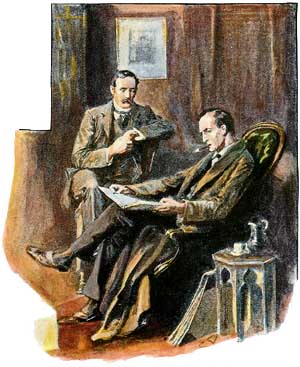| The Empty House 7 | The Empty House 8 |
Our old chambers had been left unchanged through the supervision of Mycroft Holmes and the immediate care of Mrs. Hudson. As I entered I saw, it is true, an unwonted tidiness, but the old landmarks were all in their place. There were the chemical corner and the acid-stained, deal-topped table. There upon a shelf was the row of formidable scrap-books and books of reference which many of our fellow-citizens would have been so glad to burn. The diagrams, the violin-case, and the pipe-rack – even the Persian slipper which contained the tobacco – all met my eyes as I glanced round me. There were two occupants of the room – one, Mrs. Hudson, who beamed upon us both as we entered – the other, the strange dummy which had played so important a part in the evening’s adventures. It was a wax-coloured model of my friend, so admirably done that it was a perfect facsimile. It stood on a small pedestal table with an old dressing-gown of Holmes’s so draped round it that the illusion from the street was absolutely perfect.
“I hope you observed all precautions, Mrs. Hudson?” said Holmes.
“I went to it on my knees, sir, just as you told me.”
“Excellent. You carried the thing out very well. Did you observe where the bullet went?”
“Yes, sir. I’m afraid it has spoilt your beautiful bust, for it passed right through the head and flattened itself on the wall. I picked it up from the carpet. Here it is!”
Holmes held it out to me. “A soft revolver bullet, as you perceive, Watson. There’s genius in that, for who would expect to find such a thing fired from an air-gun? All right, Mrs. Hudson. I am much obliged for your assistance. And now, Watson, let me see you in your old seat once more, for there are several points which I should like to discuss with you.”
He had thrown off the seedy frockcoat, and now he was the Holmes of old in the mouse-coloured dressing-gown which he took from his effigy.
“The old shikari’s nerves have not lost their steadiness, nor his eyes their keenness,” said he, with a laugh, as he inspected the shattered forehead of his bust.
“Plumb in the middle of the back of the head and smack through the brain. He was the best shot in India, and I expect that there are few better in London. Have you heard the name?”
“No, I have not.”
“Well, well, such is fame! But, then, if I remember right, you had not heard the name of Professor James Moriarty, who had one of the great brains of the century. Just give me down my index of biographies from the shelf.”
He turned over the pages lazily, leaning back in his chair and blowing great clouds from his cigar.

“My collection of M’s is a fine one,” said he. “Moriarty himself is enough to make any letter illustrious, and here is Morgan the poisoner, and Merridew of abominable memory, and Mathews, who knocked out my left canine in the waiting-room at Charing Cross, and, finally, here is our friend of to-night.”
He handed over the book, and I read:
Moran, Sebastian, Colonel. Unemployed. Formerly 1st Bangalore Pioneers. Born London, 1840. Son of Sir Augustus Moran, C. B., once British Minister to Persia. Educated Eton and Oxford. Served in Jowaki Campaign, Afghan Campaign, Charasiab (despatches), Sherpur, and Cabul. Author of Heavy Game of the Western Himalayas (1881); Three Months in the Jungle (1884). Address: Conduit Street. Clubs: The Anglo-Indian, the Tankerville, the Bagatelle Card Club.
On the margin was written, in Holmes’s precise hand:
The second most dangerous man in London.
“This is astonishing,” said I, as I handed back the volume. “The man’s career is that of an honourable soldier.”
| The Empty House 7 | The Empty House 8 |